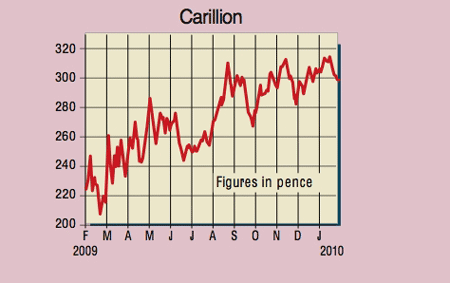Get the latest financial news, insights and expert analysis from our award-winning MoneyWeek team, to help you understand what really matters when it comes to your finances.
You are now subscribed
Your newsletter sign-up was successful
Want to add more newsletters?

Twice daily
MoneyWeek
Get the latest financial news, insights and expert analysis from our award-winning MoneyWeek team, to help you understand what really matters when it comes to your finances.

Four times a week
Look After My Bills
Sign up to our free money-saving newsletter, filled with the latest news and expert advice to help you find the best tips and deals for managing your bills. Start saving today!
One winner of this downturn has been outsourcing. Governments and companies have been busy off-loading non-core operations in order to reduce costs. The only problem is finding the right company to buy, as most outsourcers trade on stretched valuations.
Not so Carillion, Britain's largest support business (50% of sales), providing long-term repair and maintenance services for property, roads, railways, and many other types of essential infrastructure. It serves a host of government organisations (including the Ministry of Defence and the NHS) and blue-chip clients, such as BT, Virgin Media, Philips, Siemens and Unilever.
All told, the order book is worth a gigantic £17bn, representing more than three and a half years' turnover, with about 80% of that derived from public, or similarly regulated, industries.
MoneyWeek
Subscribe to MoneyWeek today and get your first six magazine issues absolutely FREE

Sign up to Money Morning
Don't miss the latest investment and personal finances news, market analysis, plus money-saving tips with our free twice-daily newsletter
Don't miss the latest investment and personal finances news, market analysis, plus money-saving tips with our free twice-daily newsletter
Yet Carillion isn't just an outsourcing story. It also constructs buildings and infrastructure, such as schools, sewage works, hospitals and prisons. This it does either directly (35% of sales), or as part of a consortium typically under one of the Public Finance Initiatives (PFI, 15% of sales). Despite the poor economic backdrop, this division is holding up well. Last Friday, Carillion announced it had bagged a £370m deal to build 26 new schools in Wolverhampton as part of Britain's £55bn Building Schools for the Future' initiative.
Carillion (LSE: CLLN), rated a BUY by Oriel Securities

Furthermore, the firm's Middle Eastern unit is performing strongly. Sales grew from £464m in 2008 to £600m in 2009. It also delivered an operating margin of 6%, which compares favourably to most Western markets. This demand has been driven primarily from Abu Dhabi and Oman and offsets some contraction in Dubai it now accounts for only 20% of the region's revenue. The firm's balance sheet is being bolstered by investor interest in its PFI projects two equity stakes were sold before Christmas for £86.9m. PFI schemes are attractive to fixed-income funds because they generate decent long-term returns when compared to 20-year gilts, which offer skinny 4.4% yields.
The City is forecasting 2009 turnover and underlying earnings per share (EPS) of £4.7bn and 37.6p. That puts the shares on an average price/earnings (p/e) ratio of eight. The firm also offers a healthy 4.7% dividend yield and zero net debt. However, I value the outsourcing unit at £1.1bn, the construction division at £500m, and the PFI portfolio at £100m. Taken together, after deducting the £176m pension deficit and £100m of central costs, that creates a fair value of about 360p per share.
But it's not all good news. Britain is likely to remain challenging as clients squeeze more savings from their partners, especially after the next election. Then there's the Dubai exposure and the usual risks inherent in this industry. These include poorly priced contracts, non-performance, fines, customer bankruptcies and foreign-exchange fluctuations. But I'm not put off. With an excellent franchise and a Himalayan-sized order book, Carillion is a buy. Preliminary results are due out on 3 March.
Recommendation: BUY at 302p
Paul Hill also writes a weekly share-tipping newsletter, Precision Guided Investments
Get the latest financial news, insights and expert analysis from our award-winning MoneyWeek team, to help you understand what really matters when it comes to your finances.
Paul gained a degree in electrical engineering and went on to qualify as a chartered management accountant. He has extensive corporate finance and investment experience and is a member of the Securities Institute.
Over the past 16 years Paul has held top-level financial management and M&A roles for blue-chip companies such as O2, GKN and Unilever. He is now director of his own capital investment and consultancy firm, PMH Capital Limited.
Paul is an expert at analysing companies in new, fast-growing markets, and is an extremely shrewd stock-picker.
-
 How a ‘great view’ from your home can boost its value by 35%
How a ‘great view’ from your home can boost its value by 35%A house that comes with a picturesque backdrop could add tens of thousands of pounds to its asking price – but how does each region compare?
-
 What is a care fees annuity and how much does it cost?
What is a care fees annuity and how much does it cost?How we will be cared for in our later years – and how much we are willing to pay for it – are conversations best had as early as possible. One option to cover the cost is a care fees annuity. We look at the pros and cons.